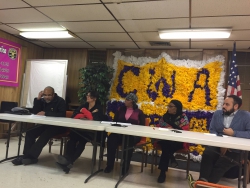Dec
14
2016

Written by Linda Campbell
Detroit, Michigan, recently became the first city in the nation to pass an ordinance designed to give community members a voice in negotiations with big developers.
Large-scale developers often receive financial support from taxpayers in the form of grants, tax abatements, and land transfers. In exchange, they sometimes promise community members certain benefits, such as employment opportunities and/or guarantees of affordable housing. But in the absence of a legally binding community benefits agreement, such promises are all too easy to break.
Detroiters have dealt with broken promises before. According to the Detroit Metro Times, the Marathon Refinery received $175 million in tax abatements—and lists only 30 employees as Detroit residents. More recently, members of the local press reported that contractors building a new hockey arena in downtown Detroit had failed to meet local hiring goals, despite receiving 60 percent of the funding from public sources. And The Wall Street Journal reported in October that Detroit’s Little Caesar’s Arena failed to meet a mandate for 51 percent of workers to be Detroit residents.
Community organizers spent years working to negotiate community benefits agreements with developers on a case-by-case basis before we realized that we needed a comprehensive accountability mechanism to insert the community voice in discussions about development. That is when a group of residents successfully collected signatures to put a forceful and binding community benefits ordinance on the November ballot this year. When a second more watered down version was proposed by a City Council member, confusion reigned. Both versions appeared on this November’s ballot and voters had to reject one and accept the other. The weaker initiative raised more than $1 million for their campaign and bombarded Detroit residents with media ads and mailers.
The community-based campaign was run by a coalition of community groups – Rise Together Detroit — which included 26 members from each of the seven city council districts. With only $11,000, they volunteered their time to support the stronger measure. Rise Together Detroit lost by only 14,000 votes, garnering nearly 100,000 yeses, 46 percent of the vote —an enormous credit to those who fought for its passage. Last month’s vote represents a radical shift in the way Detroiters have come to think about who benefits when developers come to town. It is a great signal of the power we are building for a true economic justice movement here in Detroit.
When we started fighting for a legally binding community benefits agreements, the “powers that be” just dismissed us. They laughed; and said, “That’ll never happen.” But thanks to years of organizing on-the ground, community leaders successfully worked together and shifted the narrative about what economic development should look like in Detroit, especially when public investment is involved. On Election Day, Detroiters sent a clear message that they wanted the community to be involved in – and benefit from – development decisions.
As the nation prepares for a CEO-in-chief, and the potential for even more of our public dollars to be directed into the hands of wealthy, private developers, the Detroit story holds important lessons and inspiration for grassroots efforts around the country. With effective grassroots training, education, and organizing; cultivating deep relationships among organizers and activists; and uniting behind a common cause, communities throughout the United States can resist the corporatization of government.
